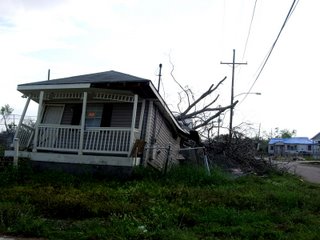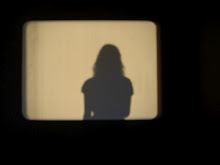Are actions just actions? Do the things that happen to us everyday simply happen, or do they leave prints, marks, pocks, holes, or lumps on our soul? If not our soul-maybe our mind, our heart? I am talking about more than just the effect of memory on us.
One African-American studies theorist claims that a "bottom-line blackness" links every black person, but not just sociologically- physically. Such that a black man, seeing a black woman raped, would feel a physical effect in his own body that a white person couldn't experience. Not to say a white person would feel nothing; just a different feeling, one that comes from a different place.
If everyday actions don't have an effect on us, what about the milemarkers of our lives? Specifically, marriage. The holy union between a man and a woman is more than just words, more than just a civil law. While non-Christians may protest that they have no more use for "religious" marriages, I refuse to believe that marriage is something that has been reduced to just a convenience, tradition, or legal necessity.
Vows of marriage link two souls, forming a connection, a union, that is not just of man. How much is life cheapened when marriage can be viewed so trivially, as something that can be called off with the touch of a button. I hate billboards that advertise cheap divorce rates. Marriage is as close as many people come to Jesus Christ. Something dies when you get married, but this sacrifice that scares so many people promises abundant blessings, as one of my friends reminds me. After this sacrifice, there is a rebirth. Just as Christ rose from the dead, a new spirit rises up between husband and wife. When they go on to have children, this spirit is manifested tangibly. It's amazing. It's important. It's unchangeable, even if it is broken from our human view.
Love. Is amazing.
Friday, April 28, 2006
more than words
Wednesday, April 26, 2006
pushing awareness

"Afterwards we go out for coffee. I have never been 'out for coffee' before."
-Push by Sapphire
A life without thought or freedom. Living in the center of the universe, without ever leaving the burrough. Watching letters swim before eyes while a man, your father, rapes you.
These are the struggles of Claireece Precious Jones. This is all part of Push, a novel that rips you and your insides out of their comfort zone and into the invisible world of so many unseen. This novel is written from Precious' point of view and chronicles her story of becoming literate. Sapphire, an African-American poet from New York, creates this dramatic structure to introduce themes of race, gender, and memory that pull into question accepted societal norms.
With a distinct voice that remains consistent throughout the novel, Sapphire creates a victim. The narration is chopped into bits by flashbacks and memories, recreating, in a narrative form, post-traumatic stress syndrome: "The air floats like water wif pictures around me sometime. Sometimes I can't breathe." Neither can the reader, pulled as he is between visceral scenes of incestual violence and hopeful classroom scenes, set in the light and airy 19th floor.
Precious' relationship with her mother is one of physical, emotional, verbal, and sexual abuse. The layers of years and years of pain and suffering form a complex parallel to slavery, and the effects of slavery are manifested in Precious, a single person. Although it is a 16-year-old illterate's journey, Precious' road to enlightment drags the reader along too, mercilessly forcing lessons upon him that he didn't even know he needed. Stereotypes that are not even acknowledged are questioned, such as when Precious goes from yearning to be beautiful ("I was like a white girl, a real person, inside") to realizing that womanhood is more than skinny model-perfect exterior beauty.
The racism, sexism, and classism issues brought the surface in this novel are difficult. Difficult to acknowledge, process, and learn from. But they couldn't be more necessary.
In the words of Sapphire: "You gonna hafta push."
Saturday, April 08, 2006
Los Estados Uniteds

We are not immune to history. The status quo is only temporary. That in mind, I propose one version of the future:
2050: New Orleans, among several southern cities such as Houston and Miami, has a majority Hispanic population.
2076: The first Hispanic-American president elected.
2100: This population continues to move northwards. Changes are seen-things along the lines of Spanish-speaking schools alongside English ones, a shift in demographics, with whites fleeing the suburbs and re-entering the city, leaving their suburban homes vacant.
2190: Whites hover precariously as the national majority.
2250: The white race has converted into a ruling elite that holds the minority, with Hispanics the majority, and African-Americans still trailing whites in numbers. One unforeseen result: whites and blacks have finally united now that they are linked by a common fear.
2350: Civil War II.
2400: The history books read like a science fiction novel, or they would to us. The United States, after the rebellion by the Hispanic-Americans who were outraged at their continued oppression, has changed rulers, the majority now the ruling class as well. The new official language is a hybrid of Spanish and English, known as Spanglish.
The country is now known as Los Estados Uniteds.
It really could happen. Do you ever think about the future?
m*
Sunday, April 02, 2006
New Orleans: The Prodigal Child

Cities are the product of their inhabitants. The DNA of a city is a complex combination of varying socioeconomic strata. The charm of a city, let’s take New Orleans as an example, is a sum of different parts. Pre-Katrina New Orleans’ charm was found in both its po’ boy’s blues AND its affluent Mardi Gras balls. The city is the offspring of its inhabitants- the rich and the poor. The city is the child; its inhabitants are its parents, who are charged with taking care of it.
Today I babysat New Orleans, driving through Gentilly, the 9th Ward, and Lakeview.
Newsflash to the world: NEW ORLEANS IS NOT BETTER.
New Orleans is still a very sick child. The patriarch of the family, the white upper-crust of Uptown, and the mother, the poor blacks of the flooded East side, have split up. They had their problems through their long marriage -- from the days of slavery to the mobs of the early 1900s – but they managed to live together in a turbulent sort of “peace.” Then the tempestuous Katrina swept the rug out from under them, exposing what had been swept beneath all those years – the dust of racial and social discrimination and strife.
Nagin has said “New Orleans is back.”
Bush has promised “one of the largest reconstruction efforts the world has ever seen.”
As I drove through streets, deserted save the odd car every five minutes, these statements were exposed as the lies they are. Unless the largest reconstruction effort the world has seen consists of a few crews in plastic body suits trying to clean thousands of homes with a few trucks and port-o-potties.
The poor of the city, a majority of African-Americans, who could not evacuate were swept up and battered, by nature and by their own national government. Eight months later, they are trying to show a happy face, like a battered wife, pretending like everything is better. Everything is not better, and the child has been left by both parents, to fend for itself. When the bustle of the French Quarter is put in relief against the silent state of the flood-damaged part of the city, the busy sounds of tourism, jazz, and the French Market have an eerie, forced quality.
A walk through the French Quarter could convince anyone new to the city that things have gotten better, even close to normal. Stores are open, tourists are stumbling around drunk, the smell of urine is strong on Bourbon- but to those familiar with the city, something is off. There is a feeling that you can’t put your finger on, a sickness, whose symptoms include occasional lumber-boarded windows, a dirty line that stretches horizontal across the entire city, and a vague feeling of malaise.
The city’s father has turned the other cheek- some say believing the problem no longer exists, others say waiting for an “ethnic cleansing by inaction.” Its mother is drowning in her own problems, too busy and too weak to be able to lift up herself, much less her ailing child.
The seeming hopelessness of it all has me wanting to scream. To scream so loud that the whole nation wakes up sweating and runs to the aid of this abandoned child. I think Jesus and George would both agree: no child left behind. Not even the sinful, poor, dirty ones.
New Orleans is an orphan, and the whole nation is waiting to see who will step forward and take charge.
Every passing week leaves the city less and less inhabitable. Nobody deserves this.
We can’t wait.
